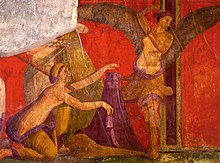This is an old revision of this page, as edited by Monkbot (talk | contribs) at 20:04, 15 January 2021 (Task 18 (cosmetic): eval 1 template: hyphenate params (1×);). The present address (URL) is a permanent link to this revision, which may differ significantly from the current revision.
Revision as of 20:04, 15 January 2021 by Monkbot (talk | contribs) (Task 18 (cosmetic): eval 1 template: hyphenate params (1×);)(diff) ← Previous revision | Latest revision (diff) | Newer revision → (diff) For the genus of moth, see Aidos (moth).| Aidos | |
|---|---|
| Goddess of shame, modesty, respect, and humility. | |
 | |
| Parents | Eusebia (mother) |
| Equivalents | |
| Roman | Pudicitia |
Aidos (Greek: Αἰδώς, pronounced [ai̯dɔ̌ːs]) was the Greek goddess of shame, modesty, respect, and humility. Aidos, as a quality, was that feeling of reverence or shame which restrains men from wrong. It also encompassed the emotion that a rich person might feel in the presence of the impoverished, that their disparity of wealth, whether a matter of luck or merit, was ultimately undeserved. Ancient and Christian humility share common themes: they both reject egotism, self-centeredness, arrogance, and excessive pride; they also recognize human limitations. Aristotle defined it as a middle ground between vanity and cowardice.
"As we become more accomplished in something, we tend to take pride in our advances and see our growing mastery, particularly when accompanied by the pleasure or approval of others, as a spur to further improvements. A pianist likes to show off her skill in playing a Beethoven sonata; an apprentice cabinetmaker feels quiet satisfaction in the work of his hands; a dancer delights in knowing the pleasure her movements bring to another. But humility is, by definition, a virtue that systematically denies us these satisfactions. It is the virtue in which we should never take pride, whether that pride is generated entirely by ourselves or fed by the approval of others."
The problem of humility is in the self-satisfaction of providing ourselves with credit for any improvement or accomplishment with which we gain, may have provided to others too, when pursuing the virtue of humility we are likely to recognize improvements, that is the result of becoming more humble. Humility is resistant to self-evaluation and self-appreciation, undertaking either is like undoing whole effort.
Mythology
She was the last goddess to leave the earth after the Golden Age. She was a close companion of the goddess of vengeance Nemesis. One source calls her daughter of Prometheus. Mythologically, she is often considered to be more of a personification than a physical deity.
There are references to her in various early Greek plays, such as Prometheus Bound by Aeschylus, Iphigenia at Aulis by Euripides, and Oedipus Rex by Sophocles.
There were altars to Aidos in Athens and in Lacedaemon.
Some sources mention Aeschyne (Ancient Greek: Αἰσχύνη) as a personification of shame and reverence; this figure appears to be equivalent to Aidos.
See also
Eleos: Goddess of pity, mercy, clemency, and compassion.
- Epiphron: God of prudence.
- Sophrosyne: Goddess of moderation and temperance.
Notes
- ^ McClay, Wilfred M. "Humility: Vice or Virtue". InCharacter.org. Retrieved 6 May 2019.
- Hesiod, Works and Days, 170 ff
- Pindar, Olympian Ode 7. 44 ff
- Pausanias, Description of Greece, 1. 17. 1
- Pausanias, Description of Greece, 3. 20. 10–11
- Aeschylus, Seven Against Thebes 409 ff
- Aesop, Fables 528
Bibliography
- Douglas L. Cairns, Aidos: The Psychology and Ethics of Honour and Shame in Ancient Greek Literature, Oxford, Clarendon Press, 1992.
References
| Ancient Greek deities | |||||||||||||
|---|---|---|---|---|---|---|---|---|---|---|---|---|---|
| Early deities | |||||||||||||
| Titans |
| ||||||||||||
| Olympian deities |
| ||||||||||||
| Water deities |
| ||||||||||||
| Personifications |
| ||||||||||||
| Other deities |
| ||||||||||||